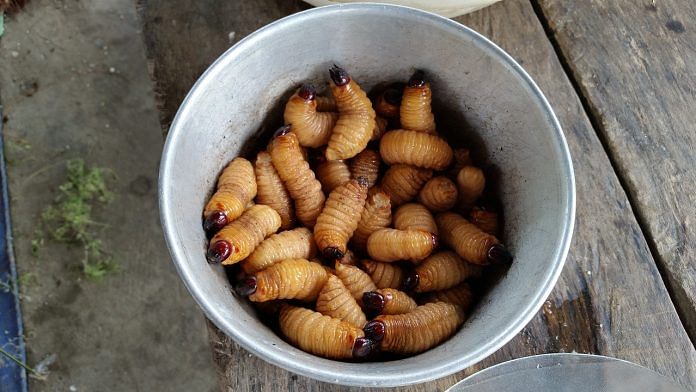Do you know what goes into your pet’s food? And would it trouble you if the answer was maggots?
Nestlé has announced it is launching a new range of its Purina pet food made partly from insect protein. The cat and dog food, initially to be sold only in Switzerland, combines black soldier fly larvae protein with plant proteins and some meat.
It’s not the only product that puts bugs on the menu for our furry friends. UK pet food manufacturer Yora offers dog food that blends insect meal with a range of vegetables for a balanced canine diet.
It’s not just vegan and vegetarian pet owners who are behind the increasing demand for alternatives to meat. As awareness of the environmental impact of meat production grows, owners are realizing that changes to their pet’s diet, as well as their own, can have a positive impact on the planet.
Also read: 31 species extinct, all freshwater dolphins threatened — IUCN releases updated Red List
Carbon pawprint
Feeding the world’s pets is big business, using surprisingly large amounts of land and resources, and producing significant levels of greenhouse gases.
One recent study estimated the pet food industry’s annual emissions as the equivalent of between 56 and 151 Mt of CO2 – on a par with Nigeria, the Philippines and many medium-sized European countries.
Researchers at the University of Edinburgh estimate that it takes an area twice the size of the UK to produce the dry food eaten by the world’s cats and dogs.
Meat production – and especially beef – has a much bigger impact on the environment than other forms of agriculture – as our chart above shows. But simply cutting animal products out of pet food is not always possible – or even desirable.
Although dogs can technically survive, and even thrive, on vegetarian diets, getting the balance of nutrients right is tricky, and the risk of poor health is high. Cats, however, need an essential amino acid called taurine, that is found in meat and fish, but not plants.
Using unwanted cuts of meat reared for humans is one way of reducing the environmental cost of pet food, and has the added benefit of creating a market for parts that would otherwise go to waste.
The WorldWide Fund for Nature (WWF) is working with many stakeholders in the pet food industry to increase the use of byproducts as a more sustainable model.
Cows or crickets?
But by using insect protein, manufacturers can cut out meat altogether. Not only do insects generate less carbon and require less land, but they can be fed on organic waste products, and are more efficient at converting what they eat into protein.
They are also very nutritious. For example, grasshoppers contain nearly as much protein, more calcium and iron, and less fat than the equivalent amount of ground beef. The British Veterinary Association has suggested that insect-based foods may even be healthier for pets. And, of course, insect farming entails fewer ethical and animal welfare concerns.
Cats and dogs aren’t the only animals that can thrive on an insect diet – their owners can too. Many people around the world already eat insects ranging from beetles to locusts and moths, both as daily staples and sought-after delicacies.
The Food and Agriculture Organization of the United Nations argues that insects will be essential to ensuring food security for a growing global population.
For the squeamish, snacking on a cicada or munching on a maggot might be unthinkable. But if it’s good enough for the four-legged members of the family, would you be prepared to give it a go?
This article was first published on World Economic Forum.
Also read: The 6 pests coming to eat our crops, thanks to climate change




Why vegan ? This isn’t 🙁
The title of this article is misleading. Maggots and larvae are animals so to describe the pet food as Vegan or Vegetarian is totally false.
Shit post